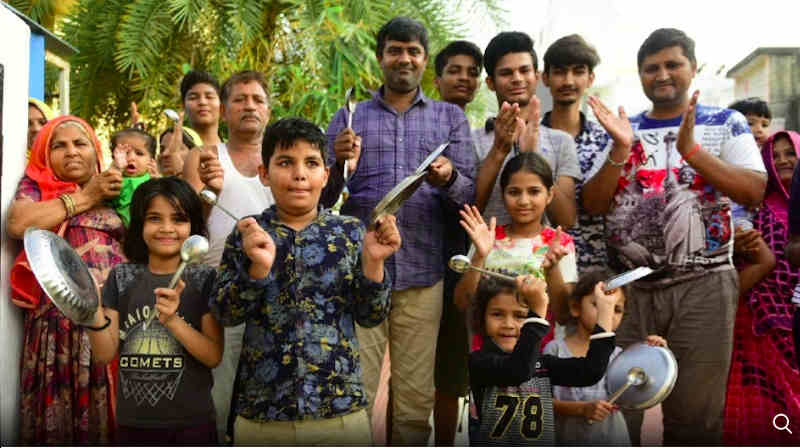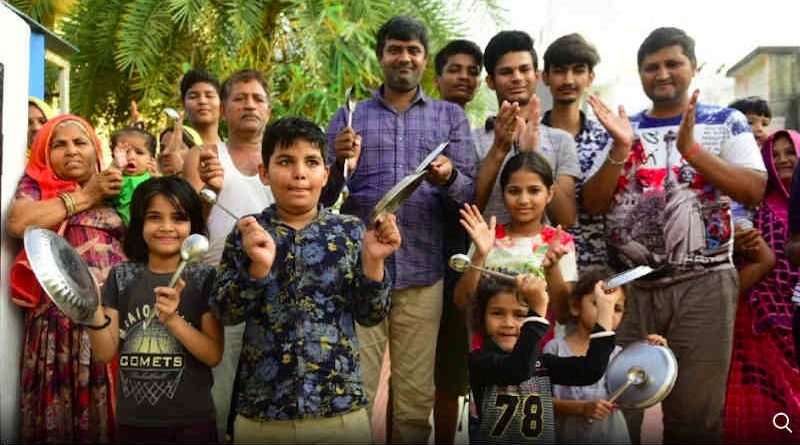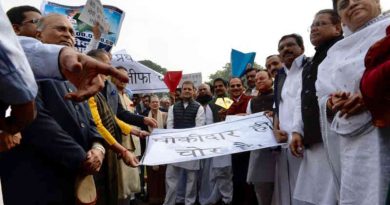Modi Model Not Working. Coronavirus to Hit 300 Million Indians: Expert

Educated people who criticize Modi for his divisive politics suggest that instead of instigating Hindu-Mulsim and Mandir-Masjid conflicts only, Modi should focus on the welfare of Indians by building healthcare infrastructure to deal with problems such as coronavirus crisis.
By Rakesh Raman
As India is not able to properly test the coronavirus (COVID-19) cases because of poor healthcare infrastructure in the country, it is not able to measure the actual impact of the disease.
Instead of providing the test and treatment facilities in hospitals and personal protective equipment (PPE) to doctors, Prime Minister (PM) Narendra Modi – who is an uneducated religious demagogue – is asking the people to hit their kitchen utensils to encourage the doctors who should keep working in high-risk hospitals to handle the coronavirus patients.
Strangely, the gullible Indians follow Modi’s mischievous advice and break all social distancing norms to stand cheek by jowl to bang their metallic vessels with spoons and forks (see picture above). Doctors hardly get encouraged with this kind of idiotic display, while coronavirus is spreading like wildfire in the country.
The chattering classes believe that India needs a wise leader who could lead the country with wisdom – instead of foolish cultism – in this hour of crisis. Modi can only deliver some toxic political speeches; he is not trained to talk on any topic – such as coronavirus – that needs a domain expertise.
Educated people who criticize Modi for his divisive politics suggest that instead of instigating Hindu-Muslim and Mandir-Masjid conflicts only, Modi should focus on the welfare of Indians by building healthcare infrastructure to deal with problems such as coronavirus crisis.
SEVERITY OF DISEASE
While currently India may have thousands of infected people with at least hundreds of deaths, health experts warn that the country of 1.4 billion people will have around 1.3 million coronavirus cases by mid-May and the infection will eventually reach 20% of the population or nearly 300 million (30 crore) people.
In other words, the number of infected people in India will be approximately equal to the entire population of the U.S. which currently has the maximum number (82,000) of the coronavirus cases in the world.
Dr. Ramanan Laxminarayan, director of the US-based Centre for Disease Dynamics, Economics and Policy, and an advisor to the World Health Organisation (WHO) and World Bank, had earlier warned India that in its worst-case scenario, 60% of its total population (or nearly 90 crore people) will get infected with the deadly virus. [ Watch related video on BBC site. ]
However, in view of the lockdown and curfews recently enforced by the Indian government, Dr. Laxminarayan believes that 20% of Indians will get infected, and the number may increase in the coming months if the people failed to follow the social distancing of at least 1.5 meters from each other.
SOCIAL DISTANCING NOT POSSIBLE
But are Indians following the social distancing guidelines? No, and it is not possible. While millions of people are homeless, an estimated 400 million people live in very small rooms in Indian slums usually called Jhughi Jhopri colonies (or J.J. colonies).
In these colonies, a family of 4 to 8 family members lives in one room of about 25 sq. meters. Multiple families share one toilet which does not have water and most can’t even afford soap to wash their hands which is required to stay safe from coronavirus.
Obviously, there is a very high probability of coronavirus contagion. As the density of population is extremely high in these colonies, the infection will quickly spread in the entire locality. It is not possible to observe social distancing in these poor localities.
These people contact a number of other people outside their colonies as the lockdown restrictions are not applicable to people who go from one place to another for buying essential commodities, such as grocery and food items.
Plus, there are hundreds of thousands of workers who are commuting freely to make and deliver essential products and services. For example, if people are getting milk and bread in their homes everyday, there are workers in the factories who are working daily to produce milk and bread – and hundreds of other such products.
Also Read:
[ Symptoms and 10 Steps to Deal with Coronavirus at Home ]
[ No Medicine for Coronavirus. But Chloroquine Gives Some Hope ]
[ Anti-Muslim Laws Pose Bigger Threat Than Coronavirus: Protesters ]
[ Coronavirus: When Tali and Thali Failed, Modi Asks People to Starve ]
[ WHO Chief Says Lockdown Alone Won’t Help. India May Have 1.3 Million Coronavirus Cases ]
[ Coronavirus: Delhi Govt Must Ban Construction and Sanitize Housing Societies ]
[ Hantavirus After Coronavirus: China’s Biological Weapons of Mass Destruction ]
And then they deliver these products at millions of shops that open everyday to sell these products. People frequently touch the items delivered by others who may have coronavirus infection. Simply put, you cannot avoid this type of physical contact with each other.
Therefore, it is impossible to follow social distancing and impossible to avoid contact. And when millions of people do not have soap and water in their homes, the lockdown and community curfew cannot succeed in containing the virus which will spread rapidly in the absence of hospitals to treat the patients.
Thus, the estimate of 300 million infected cases in India suggested by Dr. Laxminarayan is a correct observation.
DISCLOSURE AND APPEAL: I am an independent journalist and do not belong to any political party. My editorial objectivity and aversion to the flawed political system in India can be assessed from the fact that I have not voted in any Indian election during the past more than 2 decades. I strongly believe that all political parties in India are full of dishonest politicians who are hell-bent to further destroy the country which exists merely as an underdeveloped piece of land on the face of the earth.
Moreover, I am not getting donations or any other financial support for my editorial and social work. I offer all these services selflessly with my own money. Please click here to donate.
By Rakesh Raman, who is a national award-winning journalist and social activist. He is the founder of a humanitarian organization RMN Foundation which is working in diverse areas to help the disadvantaged and distressed people in the society. He also creates and publishes a number of digital publications and research reports on different subjects.




